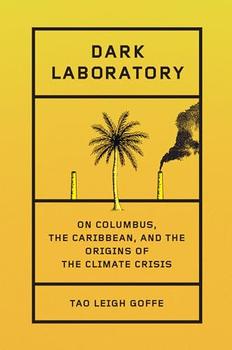Summary | Excerpt | Reviews | Beyond the Book | Readalikes | Genres & Themes | Author Bio

On Columbus, the Caribbean, and the Origins of the Climate Crisis
by Tao Leigh Goffe
During the nineteenth century, the lines reverberated from African Americans as populations passed secret instructions about how to travel and communicate safely across mountain ranges to freedom. The message of freedom from the Christian Testament of the Bible was amplified and reinterpreted alongside the prophecy of Black hope and liberation. The good news of the Underground Railroad spread across the landscape of Appalachia and the Caribbean and the Atlantic seascape. It stretched from the Bahamas to Mexico to Nova Scotia.
When, in 1967, Martin Luther King Jr. famously asked, "Where do we go from here?," he could have easily been asking a climate question. From the mountaintop there is a scale of global imagination and collaboration needed for salvation from the climate crisis. King made this speech the day before he was assassinated, perhaps prophesying that he would not make it to the Promised Land, but that God had shown him—as he had shown Moses—a view from the mountaintop. Protest songs echo across mountains as climate movements grow with the same demands for racial justice and land sovereignty.
Freedom for everyone requires a confrontation with the capitalist greed upon which Western society was founded. That sin of chattel slavery was cultivated on plantations across the United States, the Caribbean, and Latin America for centuries. Stolen land and stolen life extend across the hemisphere from sea to shining sea, and so too do the freedom trails that Black and Native peoples built during the time of enslavement out of the wilderness from Vermont to Haiti to Argentina. Black runaways had long carved clandestine routes out of the forests to freedom alongside the paths of Native peoples established thousands of years earlier. Both Black and Native peoples looked to the stars, reading constellations toward routes of freedom. For centuries, nations of Afro-Indigenous peoples found sanctuary in swamps and bogs. From the Seminoles of Florida to the Garifuna of Belize, people echoed declarations of Black Native sovereignty in parallel and in unison. Over the centuries, survival has become an art form that is also an ecological philosophy; Black and Indigenous peoples understand what it means to survive multiple time lines of apocalypse. The genocide of colonial encounter is ongoing, visible in the uneven effects of climate crisis on people of color.
By the year 2050, it is estimated that one billion people worldwide will be displaced due to natural disasters. Within the next twenty years, the majority of the world's biodiversity will have been lost due to the endangerment of key ecosystems, including coral reefs, mangroves, and mountains. Tsunamis, active volcanoes, tornadoes, earthquakes, and unrelenting heat waves abound. While I am not a climate scientist, as a professor of literature and history, I have evolved my lesson plans to face the cascade of global eco logical crisis. It is the reality and the responsibility of the individual to face this crisis and our role within it. The weather is not simply changing, as climate deniers would like us to believe. We are experiencing the consequences of a centuries-long cycle of exploitation of people of color, whom European colonial powers have forced to extract resources from the earth. The archival research I undertake on the history of racial slavery feels detached without reckoning with the climate crisis as an ongoing colonial crisis.
Poring through ledgers in Caribbean archives, I return each year not knowing what hurricane season will destroy of the delicate yellowing papers, the records the British, French, Danish, Dutch, and Spanish left behind of their exploits. Academic researchers seem to care more for the humidity and climate control of such documents than they do for human life on these islands, the descendants who have survived these regimes. To conduct research in a vacuum is a cold, unethical, and extractive approach. While my career began in such dusty record offices and official state archives in tropical countries, it soon led me to the outdoors and the importance of reclaiming environmental histories for people of color. I began to hear the birdsong that we are losing. I knew these soundtracks had been there over millennia and that we were in danger of losing them note by note just as the birds lose their habitats. The research methods I learned spending a decade in Ivy League classrooms at Princeton and Yale—close reading and other forms of textual analysis—were important, but they no longer served me. Why set about the mission of trying to extract some hidden meaning that only those specifically trained and deemed sufficiently erudite can interpret?
Excerpted from Dark Laboratory by Tao Leigh Goffe. Copyright © 2025 by Tao Leigh Goffe. Excerpted by permission of Doubleday. All rights reserved. No part of this excerpt may be reproduced or reprinted without permission in writing from the publisher.
Your guide toexceptional books
BookBrowse seeks out and recommends the best in contemporary fiction and nonfiction—books that not only engage and entertain but also deepen our understanding of ourselves and the world around us.